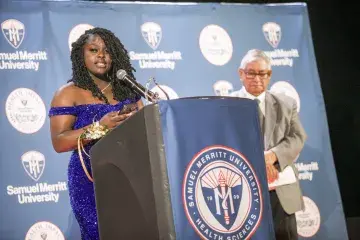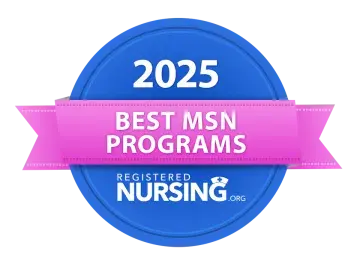Dr. Gordon Giles Wins Highest Occupational Therapy Honor

Samuel Merritt University (SMU) Professor Dr. Gordon Giles has won the most prestigious award in occupational therapy for “innovating the clinical practice of cognitive neurorehabilitation” through his groundbreaking work with patients who have endured severe brain injuries.
Giles will be presented with the Eleanor Clark Slagle Lectureship Award by the American Occupational Therapy Association (AOTA) at its 2017 Annual Conference and Centennial Celebration in Philadelphia on April 1. The award, named for a pioneer of occupational therapy, recognizes achievements in research, education and clinical practice that make substantial and lasting contributions to the profession’s body of knowledge.
Giles said he was “virtually speechless” when he received word of the award by a phone call from the AOTA president. Once the news sank in, he was elated.
“It’s the pinnacle of my professional life,” said Giles, a researcher and published scholar as well as a clinician and educator. “It will absolutely raise the profile of my work and what I want to say about the practice of occupational therapy.”
The academic honor recognizes Giles’ efforts to improve the lives of clients through novel clinical practices, including his relational neurobehavioral approach to neurorehabilitation. The non-aversive method, which Giles calls “relentless kindness,”manages patients with severe behavioral and emotional problems by building positive relationships with them rather than relying on confrontation, seclusion, or mechanical restraints.
As the director of neurobehavioral services at two Bay Area treatment centers, Giles uses this compassionate approach to treat patients with significant brain injuries whose neurological impairments have caused many of them to fail in other treatment settings due to difficult-to-manage behaviors.
Karen Scott, who graduated from SMU in 2004 and works with Giles at Crestwood Behavioral Health in Fremont, calls the positive impact he has made with both his patients and colleagues “immeasurable.”
“He is a relentless advocate for persons with neurobehavioral differences and for the role of occupational therapy practitioners in working with this population,” wrote Scott, who was quoted in Giles’ nomination letter. “He is deeply vested and meaningfully engaged both with the clients who have neurobehavioral deficits and with the staff who serve them.”
Earlier in his career, Giles introduced the neurofunctional approach to rehabilitation that trains severely impaired clients to improve their daily living skills many years after suffering traumatic brain injury. In 1993, he opened the first of several publicly funded neurobehavioral programs in California that led to hundreds of patients moving from state mental health facilities to community treatment centers. His success made him a recognized authority in addressing the behavioral problems of people with brain injury.
“Dr. Giles’ accomplishments have put him in the forefront of his field of neurocognitive rehabilitation in occupational therapy, and he is long overdue to be recognized,” said SMU Occupational Therapy Professor Donna Breger-Stanton, who nominated Giles for the award.
In her nomination letter, Breger-Stanton noted the mentorship Giles has provided to students and faculty members at SMU, where he has been teaching introductory and advances courses in clinical research and psychosocial dysfunction since the University established its Occupational Therapy Program in 1994.
“Dr. Giles is one of the most dynamic, talented professors I have ever had,” recent SMU graduate Carly Sanders was quoted in the letter. “He has the ability to interweave knowledge, insight, humor and vibrant stories into his lectures in a way that inspires his students to learn and want to know more…I can say with certainty that I am a more skilled and thoughtful researcher, scholar and therapist because of his influence.”
As part of winning the Slagle Award, Giles will deliver an AOTA lecture in 2018 that will discuss how the profession can meet the needs of clients in a changing healthcare environment.
One of his major priorities is to promote the use of new measures of functional cognition to predict if hospitalized patients are capable of performing daily living tasks, such as taking their medication or following dietary restrictions, after their discharge. Determining the needs of patients and matching them with the proper services before or after they are released can help reduce hospital recidivism, according to Giles.
“Research demonstrates that the more occupational therapy services are provided in a hospital, the less likely patients are to come back to the hospital and remain in the community,” Giles said.


